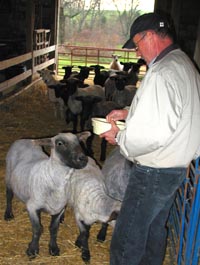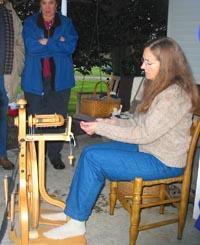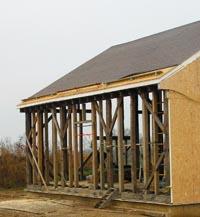Sheep and Wool Key to Success for Kentucky Couple
Sheep and Wool Key to Success for Kentucky Couple


JoAnn Adams spins wool from the sheep that will be used in her handcrafted products.
When she was a young girl, JoAnn Adams’ grandmother taught her to knit. Over the years her love of knitting sparked her interest in spinning wool and now she’s raising her own sheep with husband Sam in Henry County.
The Adams raised tobacco on their family farm until 2000 when it became clear, due to quota cuts, that they’d need other income generators to stay on the farm.
“My base had been cut so much that I leased my poundage to my uncle, who is a full- time tobacco farmer,” Sam said. “That freed me up, not having to mess with tobacco, to do other things. So, we got some sheep and started to build on that. It’s a pleasure.”
Every sheep has a name and JoAnn can tell just by looking which sheep the wool came from after it has been sheared. She uses this as a way to market her handcrafted wool products like sweaters, hats and purses.
“When I make my items, I put a tag on there to let people know the name of the sheep the wool came from, like ‘wool by Amelia’,” she said. “A lot of people like to come out and meet Amelia, Catherine or Dolly and see where it came from. They are all natural-colored, long wool sheep, so each one has a different fleece. It’s a real novelty and people are hungry for that.”
JoAnn believes consumers are getting back in touch with handmade crafts and things that are homegrown because they want to learn the history and the heritage of Kentucky.
The Adams’ farm was one stop on a 10-week series of twilight tours in Henry County designed to highlight agricultural alternatives to tobacco production. The Henry County Cooperative Extension Service sponsored the tours as a way to help farmers diversify.

Timbers from a Low Dutch meeting house are being reconstructed on the Adams' farm into a building to sell their wool and crafts.
“The series was designed to promote alternatives in agriculture that might fill in a void left by tobacco,” said Steve Moore, University of Kentucky Extension agent for agriculture and natural resources in Henry County. “We also want people to know about our Diversification Association in the county and the Phase I cost share monies they might be able to get to help them move into new ventures. We really wanted to promote people who are entrepreneurs and who are doing innovative things.”
JoAnn usually sells her items at craft shows and to individuals, but she now has an opportunity to build a unique marketplace right on her farm to use as an outlet for wool and handcrafted products. When a family across the road sold their farm, the new owner discovered some interesting timbers in an old barn.
After some research, the owner discovered the timbers were part of an old Low Dutch Meeting House and realized they needed to be preserved. The Kentucky Historic Preservation Society got involved and sought a place to put the timbers so they would be close to their original setting. The Adams volunteered to bring them to their farm. They are being reconstructed into a building where JoAnn will sell her goods. She has chosen to name the place “Sweet Home Spun at the Low Dutch Meeting House.”
“We’re really trying to stir up interest in working with wool,” Sam said. “You can have any part of it you want. If you just like to knit or if you want to learn to spin, or if you want to go as far as having your own sheep, we encourage you to do it. We’re going to have a resource center for you to come and learn to do all that.”
Sam is convinced that more people getting into the wool industry will only help everyone involved.
“We don’t look at this as competition,” he said. “The more crafters you have helps everyone.”
Moore said the Adams’ have found a way to add value to sheep production and that is what farmers must learn to do – add value to what they produce.
“They are stars when we talk about looking at alternatives,” he said. “We’re learning from them. We are still in a transition in tobacco where farmers don’t know if they’ll be raising it or not next year. We always thought that if the buyout came along we would have either a massive flux of producers into tobacco fulltime or a mass exodus out of tobacco production altogether. Right now we just don’t know and we think it’s the right time to keep promoting alternatives.”
